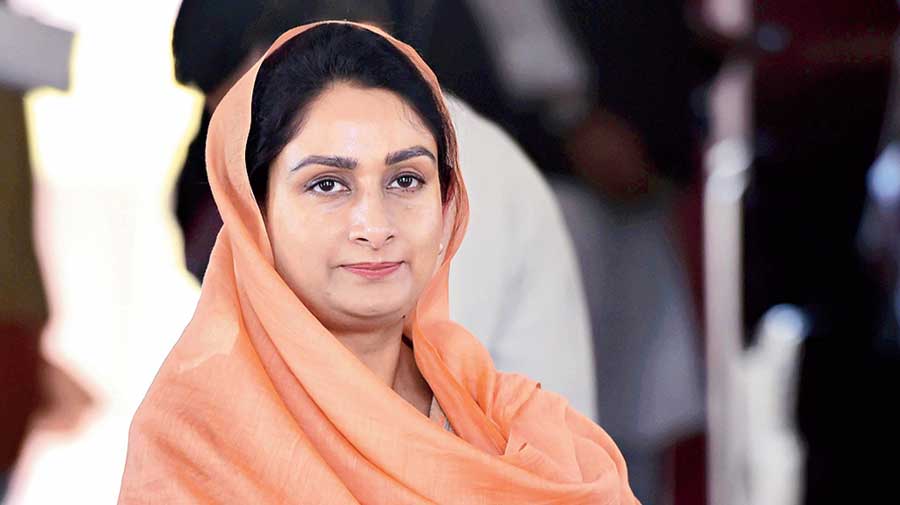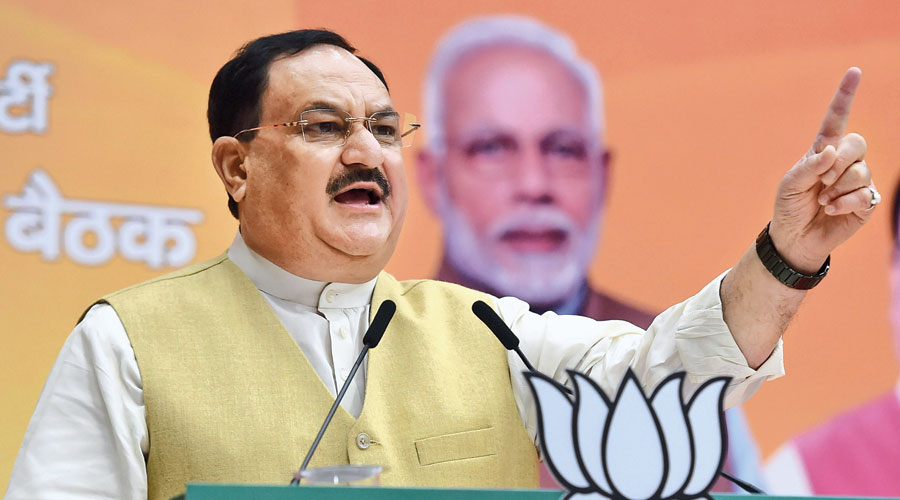BJP ally Shiromani Akali Dal’s lone Union minister Harsimrat Kaur Badal resigned on Thursday to protest the Centre’s farm sector reforms, calling the Narendra Modi government “anti-farmer” on a day the ruling party marked the Prime Minister’s birthday by projecting him as a messiah for peasants and the poor.
That Harsimrat, the food processing minister, would resign was announced in the Lok Sabha by her husband, Akali chief Sukhbir Singh Badal, when two of the bills were being debated in the Lok Sabha.
Harsimrat, who was in the House, tweeted after former Punjab deputy chief minister Sukhbir’s announcement: “I have resigned from Union Cabinet in protest against anti-farmer ordinances and legislation. Proud to stand with farmers as their daughter and sister.”
She told reporters outside Parliament later: “Thousands of farmers are on the streets. I do not want to be part of the government that got the bills passed without addressing the apprehensions of farmers.”
During the debate, Sukhbir, whose party is primarily based in the agriculture-rich Punjab, said the Farmers’ Produce Trade and Commerce (Promotion and Facilitation) Bill and the Farmers’ (Empowerment and Protection) Agreement on Price Assurance and Farm Services Bill would “destroy” the 50 years of hard work put in by successive governments in the state and farmers to build the agriculture sector.
He recalled Punjab’s massive contribution in making India self-sufficient in food grain production as he vehemently opposed the bills. Sukhbir, however, made it clear that the Akali Dal would extend outside support to the Modi government. The Akali Dal has two members, Sukhbir and Harsimrat, in the Lok Sabha and three in the Rajya Sabha.
The two bills were eventually passed in the Lok Sabha by voice vote, with the Congress and some other Opposition parties staging a walkout. Harsimrat, however, sat quietly when the bills were passed. Sukhbir told reporters outside Parliament that the Akalis would “do anything” for farmers.
A third, the Essential Commodities (Amendment) Bill, had been passed in the Lok Sabha on Tuesday but the other two had been held back because of the Akali Dal’s opposition.
BJP president J.P. Nadda had tried to pacify the Akalis by saying that the government would look into their concerns.
Sukhbir refuted suggestions that his party had initially supported the three ordinances, which the government has replaced with bills that it wants passed in Parliament, and asserted that Harsimrat had expressed her concerns at the cabinet meeting where they were discussed and also written to agriculture minister Narendra Singh Tomar highlighting “flaws”.
Harsimrat’s resignation would make no material difference to the Modi government but it’s political impact could be substantial. The Akali Dal is the BJP’s oldest ally now that the Shiv Sena has severed ties with the ruling party at the Centre. The BJP is yet to react to the resignation.
The psychological blow of the snub can’t be wished away by the BJP either as it came on Modi’s 70th birthday. Although the government and the party had proclaimed that there would be no celebrations in view of the pandemic, massive efforts were made to project Modi as a messiah of the poor and the farmers.
Modi tweeted after the bills were passed: “The passage of the historic agri-reforms bills in the Lok Sabha marks an important moment for the country’s farmers and agri-sector. These bills in the true sense will liberate farmers from middlemen and all kinds of impediments.”
The proposed laws have triggered intense protests by farmers in Punjab, Haryana and parts of Uttar Pradesh. The farmers, and the Congress, have said the changes would deprive peasants of minimum support price and help corporates take over the agriculture sector. In Punjab, chief minister and Congress veteran Amarinder Singh is playing a key role in the protests.
Amarinder tweeted on Thursday night: “Harsimrat Kaur’s decision to quit Union Cabinet is another in the long chain of theatrics being enacted by @Akali_Dal which has still not quit ruling coalition. It’s motivated not by any concern for farmers but to save their own dwindling political fortunes. Too little too late.”
Although the Centre has been claiming that MSP would in no way be affected, the farmers’ outfits are not convinced. They have called a strike on September 25 and threatened not to allow the MPs who would support the legislation enter their constituencies.
The Congress and some other parties have been firmly opposing the bills and the government could find it difficult to pass them in the Rajya Sabha, where the Opposition is better placed than in the Lok Sabha in terms of numbers.
The Opposition on Thursday termed the three bills a “toxic triangle” and claimed that by deregulating the agri-markets and allowing contract farming, the government was allowing big corporates to exploit the farmers.
“It will lead to proleteriatisation of the peasants,” RSP member N.K. Premchandran, who moved a number of amendments, said.
Agriculture minister Tomar pleaded the House to support the bills, claiming they would prove to be a “life-changer” for farmers. He said the bills would open more avenues for farmers to sell their produce in addition to the government-regulated agriculture produce marketing corporations.











